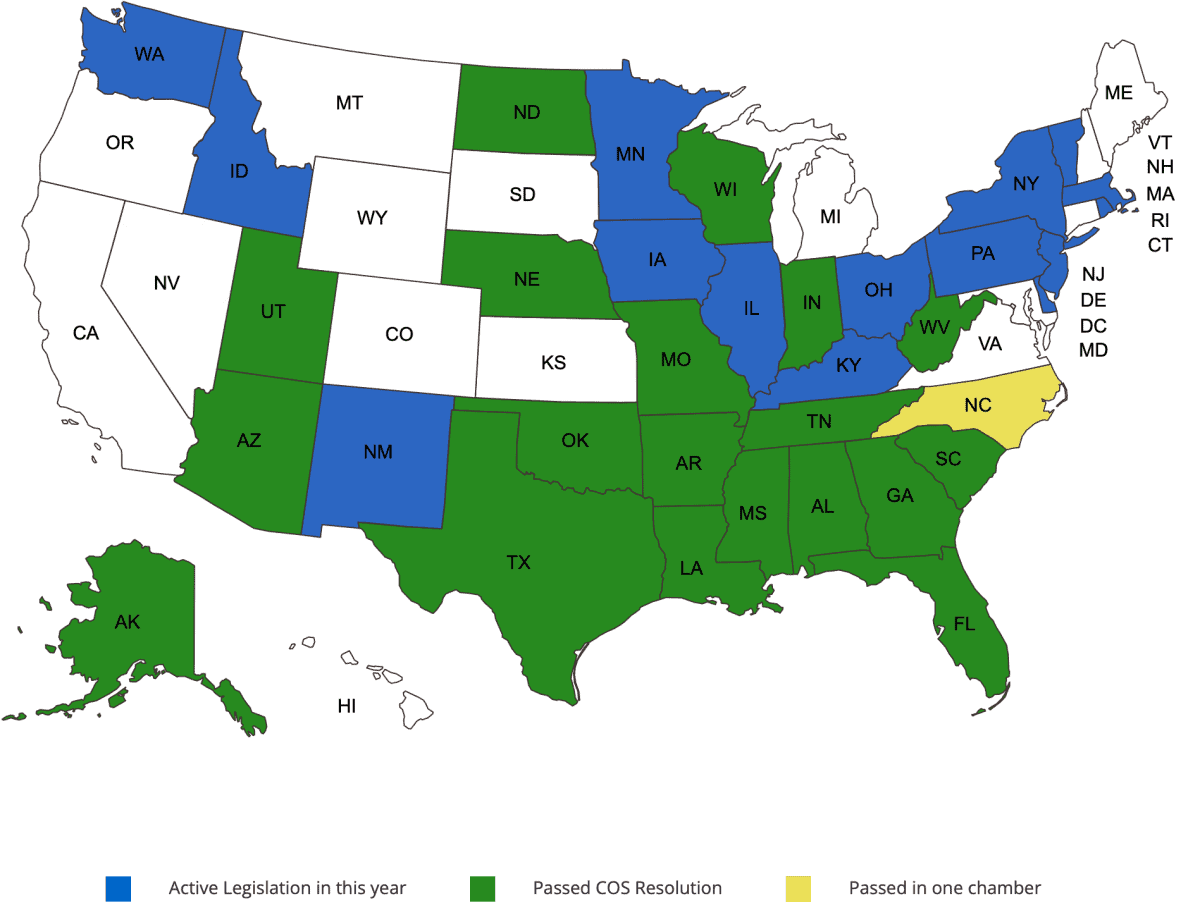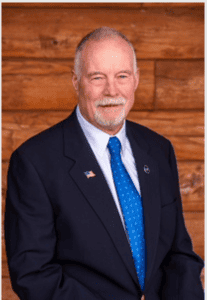Two Kansas state legislators, Sen. Mike Thompson and Rep. Michael Murphy, have filed a federal lawsuit alleging the state Constitution imposes an unconstitutional burden on those supporting a call of the Convention of States to propose amendments to the U.S. Constitution.
Article 5 of the federal Constitution provides two ways to add to its current 27 amendments.
“The Congress, whenever two thirds of both Houses shall deem it necessary, shall propose Amendments to this Constitution, or, on the Application of the Legislatures of two thirds of the several States, shall call a Convention for proposing Amendments, which, in either Case, shall be valid to all Intents and Purposes, as Part of this Constitution, when ratified by the Legislatures of three fourths of the several States, or by Conventions in three fourths thereof, as the one or the other Mode of Ratification may be proposed by the Congress; Provided that no Amendment which may be made prior to the Year One thousand eight hundred and eight shall in any Manner affect the first and fourth Clauses in the Ninth Section of the first Article; and that no State, without its Consent, shall be deprived of its equal Suffrage in the Senate.”
34 states approving a convention are necessary for the first to be called since the original one in 1787; 19 have so far done so:

The issues to be debated at the proposed convention are:
- Imposing fiscal restraints on the federal government
- Limiting the power and jurisdiction of the federal government
- Term Limits for Members of Congress
At issue in the legislators’ lawsuit is Article 2, Section 13 of the Kansas Constitution, which reads:
A majority of the members then elected (or appointed) and qualified of each house, voting in the affirmative, shall be necessary to pass any bill. Two-thirds (2/3) of the members then elected (or appointed) and qualified in each house, voting in the affirmative, shall be necessary to ratify any amendment to the Constitution of the United States or to make any application for Congress to call a convention for proposing amendments to the Constitution of the United States.
Sen. Thompson and Rep. Murphy contend the 2/3 requirement is an unconstitutional burden placed on them. Citing the wording in their lawsuit, when considering an Article 5 Convention, they contend are acting with federal authority and not to be governed by a state constitution:
- This super-majority requirement violates the federal Constitution. Article V of the U.S. Constitution sets forth exclusive procedures for Congress and state legislatures to amend the federal Constitution.
- When state legislatures act pursuant to their authority under Article V, they exercise a federal function from federal law.
- States cannot, whether through their constitutions or state law, impose limitations or additional procedural requirements on state legislatures acting pursuant to this federal authority.

Thompson and Murphy are actually suing two colleagues, Senate President Ty Masterson and House Speaker Dan Hawkins. As the legislative leaders in each body, and following the Kansas Constitution, Masterson and Hawkins ruled in 2023 that a Senate Resolution and a companion in the House failed to receive the 2/3 majority required for passage. The Senate vote failed by five votes and the House measure by eight.
The fact that both leaders sided with supporters of the resolutions calling for the convention makes opponents wonder how spirited a defense Masterson and Hawkins will mount in the lawsuit.
They have filed a motion on their own to intervene in the lawsuit. Their concerns were heightened by a second motion filed by Plaintiffs Thompson and Murphy jointly with Defendants Masterson and Hawkins, requesting the case be brought to a close and a decision rendered without further legal proceedings.
We asked both Sen. Thompson and Rep. Murphy to comment on the merits of their convention of states litigation:
Sen. Thompson:
“The conflict arises as a result of the fact that we are NOT proposing an amendment to the U.S. Constitution. We are proposing Kansas’ application to an Article V convention where potential amendments may be discussed. Neither of those scenarios should require more than a majority vote. Not until a vote on an actual amendment occurs should the 2/3 majority vote apply. The Kansas Constitution therefore impedes what the U.S. Constitution provides as a remedy.”
Rep. Murphy:

“I believe the constitutional amendment placed into the Kansas Constitution back in the 1970s added burden to us as legislators that exceeds what the US Constitution requires and is therefore unconstitutional.”
What about long-held concerns of a “runaway convention”?
Rep. Murphy:
“No, anything outside the three subject areas of the resolution would not be germane. This is not a constitutional convention; it is a meeting of states to come up with ideas. Any which come out of that meeting would require 3/4 of the states, 38, to ratify.”
Finally, what of the concerns of opponents that you two are working behind the scenes with Sen. Masterson and Speaker Hawkins to add Kansas to the list calling for the Convention of States?
Rep. Murphy had no opinion, but Sen. Thompson did:
“That is tin-foil hat nonsense. The Speaker and the President were the logical defendants in this lawsuit as they were following their rules based on what the Kansas Constitution says. Our contention is really with the Kansas Constitution, but since they (the Speaker and President) used the Kansas Constitution to decide the outcome of the floor votes, they became the persons we had to file against. I would ask the people making the claim of collusion who they think should be the proper defendants in this case; I bet they can’t come up with a cogent answer.”
We reached out to opponents of the resolutions calling for the convention of states and asked if they were in favor of term limits but were concerned about the so-called “runaway convention” and their opinion of “pre-emption”; that Congress would pre-empt a Convention’s deliberations on term limits to impose its own, to ensure that sitting members of Congress are not subject to term limits.

Rep. Fred Gardner:
“The Constitution of the United States offers a clear remedy for term limits with free and fair elections by the people. Any representative or senator can be removed by majority vote of the people at the next election.
“Article V of the U.S. Constitution does not give clear authority to ONLY consider amendments dealing with term limits or debt. Once opened, amendments can be proposed on all topics.”
Sen. John Doll:
“I’m not running for the Senate next term because I believe in term limits. I served two terms in city government, two terms in the Kansas House, and finishing my second term in the Senate. I’m not sure I want a law. I would hope voters would take care of it. Of course, that won’t happen, so I would vote for term limits.”
Sen. Doll said he had not had a chance to study the pre-emption issue.
Sen. Dennis Pyle:
“The question of the delegates to an Article 5 convention, if one is called, has been my concern. I have introduced legislation to address the delegate selection process, SB 385. It is my contention that this should be determined prior to calling the convention.”
There is no apparent time limit for the calling of a Convention of States. The first state to call for one, Georgia, did so on March 6, 2014.


